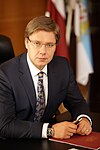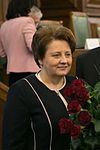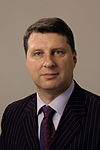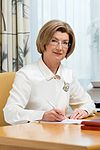The Socialist Party of Latvia was formed in 1994 as a successor party to the Communist Party of Latvia, which was banned in 1991. In essence, the party is communist; according to the programme of the party, the LSP was founded as an organization upholding socialist ideas after the 1991 events that the party describes as a 'counter-revolutionary bourgeois-nationalist coup'.
The Latvian Green Party is a green political party in Latvia. It was founded on 13 January 1990 and is a member of the European Green Party. Unusually for a green party in Europe, the LZP is generally considered a centre-right party. Leading politicians of the party have often supported reactionary, nationalist, and anti-LGBT positions. The party has only gained representation in the Saeima by forming electoral alliances with other parties.

The Latvian Russian Union (LKS) is an ethnic minority, left-wing political party in Latvia, supported mainly by ethnic Russians and other Russian-speaking minorities. The co-chairpersons of the Latvian Russian Union are Miroslav Mitrofanov, Yuriy Petropavlovsky and Tatjana Ždanoka.
This article gives an overview of liberalism in Latvia. It is limited to liberal parties with substantial support, mainly proved by having had a representation in the Saeima. The sign ⇒ denotes another party in that scheme. For inclusion in this scheme it isn't necessary so that parties labelled themselves as a liberal party.

The Latvian Farmers' Union is a centrist, agrarian political party in Latvia.

Parliamentary elections were held in Latvia on 7 October 2006. The governing coalition, led by Prime Minister Aigars Kalvītis and his People's Party, won the election. Kalvitis's government thus became the first to be re-elected since Latvia had regained independence in 1991.
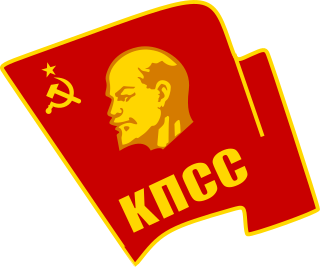
Communist Party of Latvia was a political party in Latvia.

Parliamentary elections were held in Latvia on 2 October 2010. It was the first parliamentary election to be held in Latvia since the beginning of the economic crisis during which Latvia had experienced one of the deepest recessions in the world.
Responsibility – Social Democratic Alliance of Political Parties is a political coalition in Latvia, until 2010 called Libertas.lv, which was the local branch of Declan Ganley's Libertas Party. Unlike Libertas in other countries, Libertas Latvia was not a political party in its own right. Instead, candidates from Mūsu Zeme, Sociālā Taisnīguma Partija and Latvijas Atmoda contended the 2009 European Parliament elections in Latvia under common lists branded with the Libertas identity. The candidates retained their membership of their national parties and the national parties retained their legal identity.

Parliamentary elections were held in Latvia on 6 October 2018.
New Unity is a liberal-conservative political party in Latvia. It is currently the largest party of the centre-right in Latvian politics and was the leading party in the Dombrovskis and Straujuma cabinets from its inception in 2010 until February 2016 and is a member of the current coalition since January 2019 with its member Krišjānis Kariņš as Prime Minister. Unity is a member of the European People's Party (EPP).
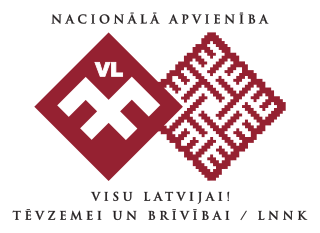
The National Alliance, officially the National Alliance "All For Latvia!" – "For Fatherland and Freedom/LNNK", abbreviated to NA, is a right-wing populist, national-conservative political party in Latvia. With thirteen seats in the Saeima, the National Alliance is the fourth-largest party in the national parliament and the third-largest party in the government. The party is a coalition of conservatives, Latvian ethnonationalists, and economic liberals.

Early parliamentary elections were held in Latvia on 17 September 2011, following the country's first parliamentary dissolution referendum held on 23 July 2011. The previous parliamentary election was only held in October 2010.
United for Latvia is a populist and economically liberal political party in Latvia. It was founded in 2011 in Rēzekne and in 2013 Ainārs Šlesers became party chairman. Šlesers has been dubbed one of the three "oligarchs" prominent in Latvian politics, and United for Latvia marks his return to electoral politics. He was previously leader of Latvia's First Party/Latvian Way and has served in several governments of Latvia including as Deputy Prime Minister in the government of Aigars Kalvītis and Minister of Transport in the second government of Ivars Godmanis, both of whom are party members. Other formerly prominent Latvian politicians who are now party members include Jānis Jurkāns and Jānis Straume. The party is yet to win seats in the Saeima or the European Parliament. Šlesers and several other party members have been in the past among the Latvian politicians most willing to cooperate with Harmony and other Russian parties in Latvia.
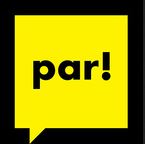
Movement For! is a liberal political party in Latvia. The party was founded on 26 August 2017 at the House of Culture Rītausma in Riga with 298 party members. The party is one of the members of the Development/For! alliance.

The Progressives is a social democratic political party in Latvia. The party was founded on February 25, 2017. Since February 24, 2018, its chairman has been Roberts Putnis. The Progressives currently do not hold any seats in the Saeima or in the European Parliament.


